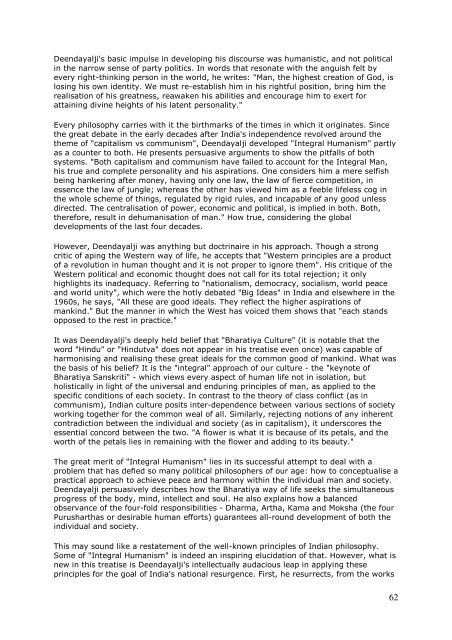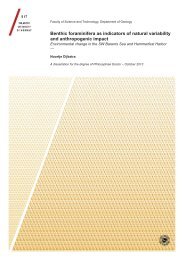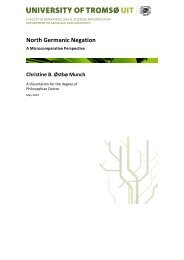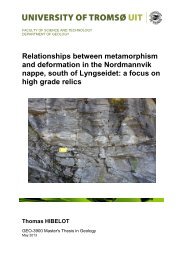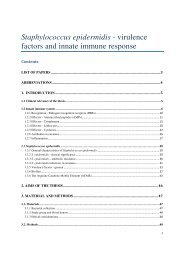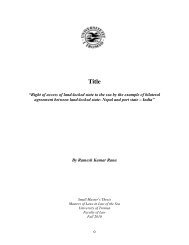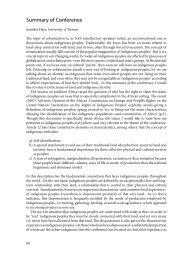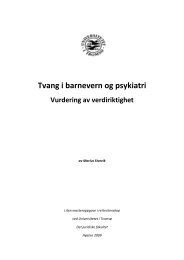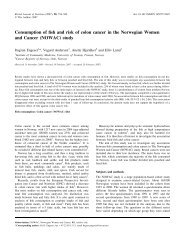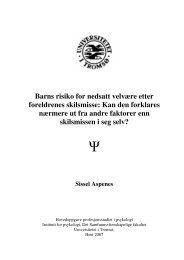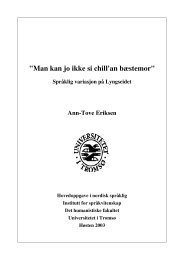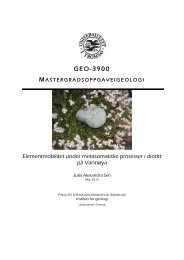Hindutva, Hindunasjonalisme og Bharatiya Janata Party En ...
Hindutva, Hindunasjonalisme og Bharatiya Janata Party En ...
Hindutva, Hindunasjonalisme og Bharatiya Janata Party En ...
Create successful ePaper yourself
Turn your PDF publications into a flip-book with our unique Google optimized e-Paper software.
Deendayalji's basic impulse in developing his discourse was humanistic, and not political<br />
in the narrow sense of party politics. In words that resonate with the anguish felt by<br />
every right-thinking person in the world, he writes: "Man, the highest creation of God, is<br />
losing his own identity. We must re-establish him in his rightful position, bring him the<br />
realisation of his greatness, reawaken his abilities and encourage him to exert for<br />
attaining divine heights of his latent personality."<br />
Every philosophy carries with it the birthmarks of the times in which it originates. Since<br />
the great debate in the early decades after India's independence revolved around the<br />
theme of "capitalism vs communism", Deendayalji developed "Integral Humanism" partly<br />
as a counter to both. He presents persuasive arguments to show the pitfalls of both<br />
systems. "Both capitalism and communism have failed to account for the Integral Man,<br />
his true and complete personality and his aspirations. One considers him a mere selfish<br />
being hankering after money, having only one law, the law of fierce competition, in<br />
essence the law of jungle; whereas the other has viewed him as a feeble lifeless c<strong>og</strong> in<br />
the whole scheme of things, regulated by rigid rules, and incapable of any good unless<br />
directed. The centralisation of power, economic and political, is implied in both. Both,<br />
therefore, result in dehumanisation of man." How true, considering the global<br />
developments of the last four decades.<br />
However, Deendayalji was anything but doctrinaire in his approach. Though a strong<br />
critic of aping the Western way of life, he accepts that "Western principles are a product<br />
of a revolution in human thought and it is not proper to ignore them". His critique of the<br />
Western political and economic thought does not call for its total rejection; it only<br />
highlights its inadequacy. Referring to "nationalism, democracy, socialism, world peace<br />
and world unity", which were the hotly debated "Big Ideas" in India and elsewhere in the<br />
1960s, he says, "All these are good ideals. They reflect the higher aspirations of<br />
mankind." But the manner in which the West has voiced them shows that "each stands<br />
opposed to the rest in practice."<br />
It was Deendayalji's deeply held belief that "<strong>Bharatiya</strong> Culture" (it is notable that the<br />
word "Hindu" or "<strong>Hindutva</strong>" does not appear in his treatise even once) was capable of<br />
harmonising and realising these great ideals for the common good of mankind. What was<br />
the basis of his belief? It is the "integral" approach of our culture - the "keynote of<br />
<strong>Bharatiya</strong> Sanskriti" - which views every aspect of human life not in isolation, but<br />
holistically in light of the universal and enduring principles of man, as applied to the<br />
specific conditions of each society. In contrast to the theory of class conflict (as in<br />
communism), Indian culture posits inter-dependence between various sections of society<br />
working t<strong>og</strong>ether for the common weal of all. Similarly, rejecting notions of any inherent<br />
contradiction between the individual and society (as in capitalism), it underscores the<br />
essential concord between the two. "A flower is what it is because of its petals, and the<br />
worth of the petals lies in remaining with the flower and adding to its beauty."<br />
The great merit of "Integral Humanism" lies in its successful attempt to deal with a<br />
problem that has defied so many political philosophers of our age: how to conceptualise a<br />
practical approach to achieve peace and harmony within the individual man and society.<br />
Deendayalji persuasively describes how the <strong>Bharatiya</strong> way of life seeks the simultaneous<br />
pr<strong>og</strong>ress of the body, mind, intellect and soul. He also explains how a balanced<br />
observance of the four-fold responsibilities - Dharma, Artha, Kama and Moksha (the four<br />
Purusharthas or desirable human efforts) guarantees all-round development of both the<br />
individual and society.<br />
This may sound like a restatement of the well-known principles of Indian philosophy.<br />
Some of "Integral Humanism" is indeed an inspiring elucidation of that. However, what is<br />
new in this treatise is Deendayalji's intellectually audacious leap in applying these<br />
principles for the goal of India's national resurgence. First, he resurrects, from the works<br />
62


